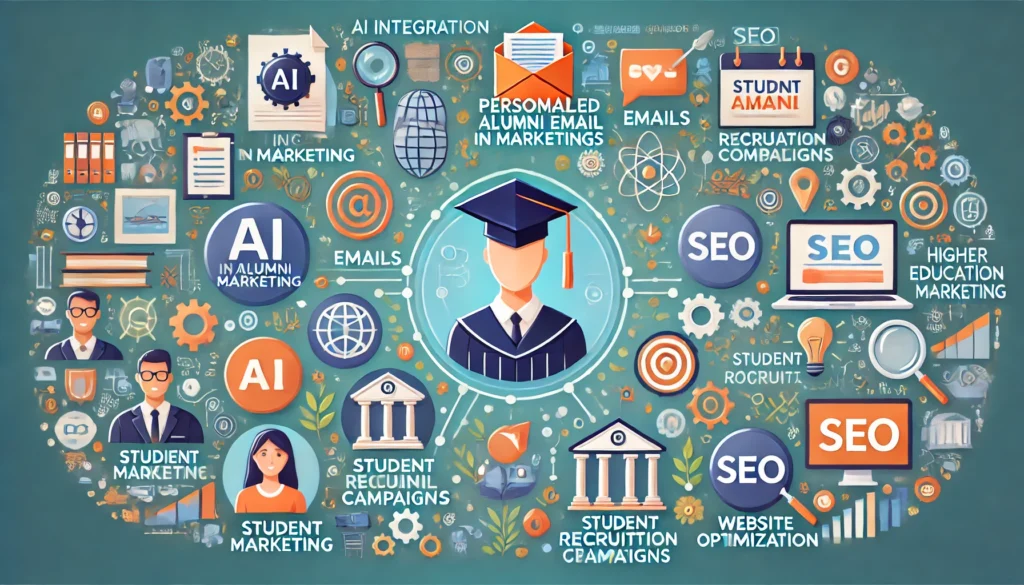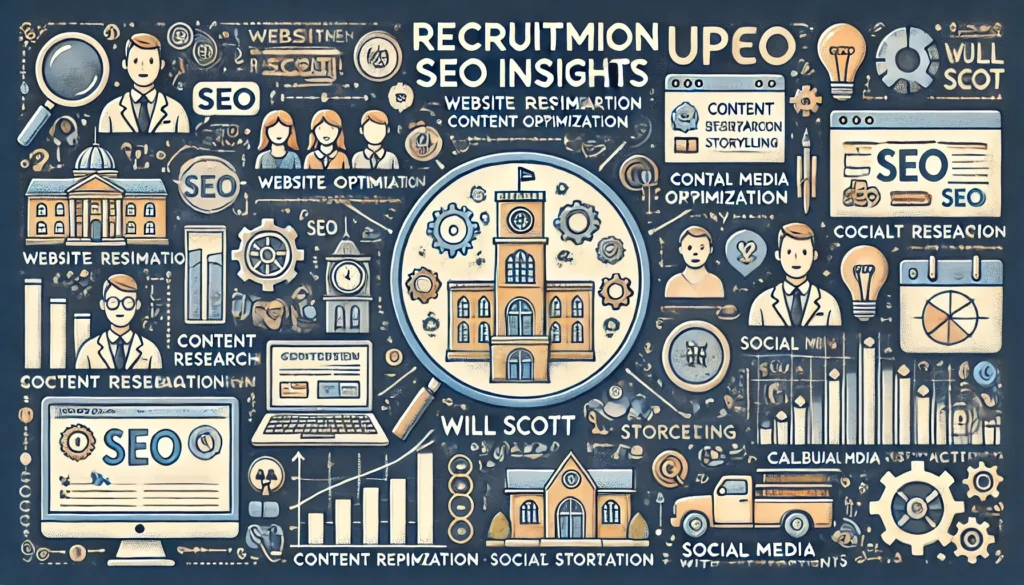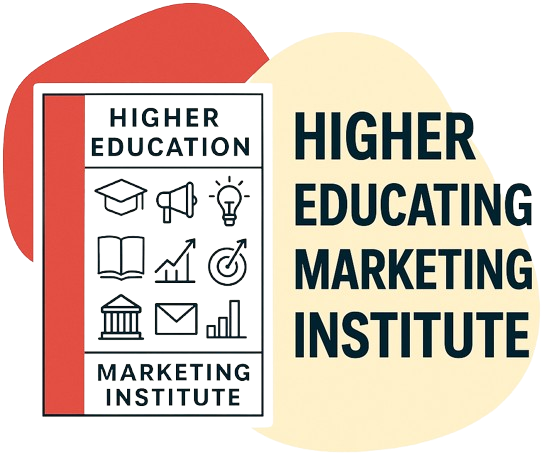Common themes:
- AI in Marketing:
- Potential benefits of AI in higher education marketing.
- Overcoming challenges like understanding, privacy concerns, and limited resources.
- Importance of investing in AI technology, training, and collaboration.
- Alumni Email Marketing:
- Effective strategies for engaging alumni via email.
- Importance of personalization, segmentation, and goal-setting.
- Integration with other communication channels.
- Student Recruitment:
- Optimization strategies for the prospective student journey.
- Personalized and targeted communication.
- Strategies like content marketing, social media advertising, and email campaigns.
- SEO for Recruitment:
- Importance of SEO in enhancing recruitment efforts.
- Website optimization, keyword research, and content optimization.
- Collaboration with academic departments and focusing on user experience.
Surprising points:
- AI in Marketing:
- Emphasizing AI as a tool to enhance rather than replace human jobs.
- Creating a culture that embraces AI and experimentation.
- Alumni Email Marketing:
- Using alumni feedback to continuously improve strategies.
- Offering exclusive benefits or discounts to enhance engagement.
- Student Recruitment:
- Differentiated strategies for schools of varying sizes.
- Importance of understanding students’ decision-making processes.
- SEO for Recruitment:
- Emphasis on storytelling and emotional connections.
- Collaboration with academic departments as part of SEO strategy.

Your Marketing Team Knows AI is the New Jackpot. What Hinders Its Growth: University Business
UPCEA
Synopsis:
- The article discusses the potential benefits of using artificial intelligence (AI) in marketing, particularly in the higher education sector.
- AI can help improve targeting, personalization, automation, and decision-making in marketing campaigns.
- However, there are several challenges that hinder the growth of AI in marketing, such as lack of understanding, data privacy concerns, and limited resources.
- The article suggests that universities should invest in AI technology, train their marketing teams, and collaborate with AI experts to overcome these challenges.
- It also emphasizes the importance of creating a culture that embraces AI and being willing to experiment with new approaches.
Background resources:
- None mentioned in the article.
Unique/noteworthy positions by the author:
- The author highlights that many universities are already using AI in various aspects, but its potential in marketing is yet to be fully realized.
- The article suggests that universities should view AI not as a threat to human jobs, but rather as a tool to enhance marketing effectiveness.
Summary and takeaways:
- AI has the potential to revolutionize marketing in the higher education sector by improving targeting, personalization, automation, and decision-making.
- Lack of understanding, data privacy concerns, and limited resources hinder the growth of AI in marketing.
- Universities should invest in AI technology, train their marketing teams, and collaborate with AI experts to overcome these challenges.
- Embracing AI and being open to experimentation are crucial for success in utilizing AI in marketing.
“🤖🎯 AI is the jackpot! Overcome challenges: understanding, privacy, resources. Invest, train, collaborate. #AIinMarketing #HigherEd”
Tweet

Mastering University Alumni Email Marketing Strategies
Higher Education Marketing
- The article discusses effective strategies for email marketing to university alumni.
- It emphasizes the importance of segmenting the alumni email list to deliver personalized and relevant content.
- The author suggests using alumni data from various sources to create targeted campaigns.
- The article highlights the significance of establishing goals and objectives for alumni email marketing campaigns.
- It emphasizes the need to track and analyze email metrics to measure the success of the campaigns.
- The author recommends integrating email marketing with other communication channels for a holistic approach.
- The article provides tips for creating compelling email content, including storytelling and incorporating multimedia.
- It suggests offering exclusive benefits or discounts to alumni to enhance engagement.
- The author underscores the value of soliciting feedback from alumni through surveys and using it to improve email marketing strategies.
Takeaways:
- Segmenting the alumni email list and delivering personalized content is vital for successful email marketing campaigns.
- Set measurable goals and regularly analyze email metrics to assess the effectiveness of campaigns.
- Integrate email marketing with other communication channels for a comprehensive approach.
- Use storytelling, multimedia, and exclusive benefits to engage alumni.
- Solicit feedback from alumni to continuously improve email marketing strategies.
“🎓💼 Boost alumni engagement with targeted emails! Personalized content and analytics help universities thrive. #AlumniEngagement #EmailMarketing”
Tweet
The Prospective Student Journey: Marketing Optimizations for Schools of All Sizes – Advance Education
Advance Education
Synopsis:
- The article discusses marketing strategies for schools to optimize the prospective student journey.
- It highlights the importance of understanding students’ needs, preferences, and decision-making process.
- Different stages of the student journey, from awareness to enrollment, are explored.
- The author emphasizes the significance of personalized and targeted communication in attracting and engaging students.
- Strategies such as content marketing, social media advertising, and email campaigns are suggested for effective student recruitment.
- The article also considers the unique challenges and opportunities faced by schools of different sizes.
- Background resources cited include industry reports, case studies, and marketing research.
Noteworthy Positions:
- The author emphasizes the need for schools to tailor their marketing efforts to suit the preferences and behaviors of prospective students.
- Personalization and targeted communication are highlighted as key factors for success in student recruitment.
- Differentiated marketing strategies are suggested for schools of varying sizes, taking into account their specific resources and limitations.
Summary and Takeaways:
- Understanding the prospective student journey is crucial for schools to optimize their marketing efforts.
- Personalized and targeted communication is essential throughout the entire student journey.
- Strategies such as content marketing, social media advertising, and email campaigns can be effective for student recruitment.
- Schools must adapt their marketing strategies based on their size and available resources.
- The article provides actionable insights and suggests further resources for schools looking to improve their marketing optimizations.
“🎓📈 Optimize student recruitment with personalized marketing! Tailor strategies to student preferences. 🎯📣 #StudentJourney #MarketingSuccess”
Tweet

Gain Recruitment SEO Insights From Will Scott’s Recent UPCEA Blog Post
searchinfluence.com
Synopsis:
- Will Scott, CEO of Search Influence, recently wrote a blog post for UPCEA about recruitment SEO insights.
- The article highlights the importance of optimizing websites to attract and engage potential students in order to enhance recruitment efforts.
- Scott provides valuable strategies and tips to improve organic visibility, website structure, and content optimization.
- He emphasizes the significance of keyword research, creating targeted landing pages, and leveraging social media platforms for recruitment SEO.
- The author also suggests collaborating with academic departments, using storytelling techniques, and focusing on user experience to drive recruitment success.
- Scott’s insights are based on his extensive experience in recruitment SEO and aim to help educational institutions improve their online presence and attract the right students.
Background Resources:
- The blog post references the author’s previous article on understanding Google’s E-A-T guidelines.
- No other background resources are cited in the article.
Unique/Noteworthy Positions:
- The author stresses the role of storytelling and emotional connections in recruitment SEO, which may set him apart from other SEO professionals.
- Scott emphasizes the importance of user experience and collaboration with academic departments in the recruitment process.
Summary and Takeaways:
- Will Scott’s UPCEA blog post provides valuable insights into recruitment SEO.
- Educational institutions can improve their online presence and attract the right students by optimizing their websites, conducting keyword research, and leveraging social media platforms.
- Collaboration with academic departments, storytelling techniques, and focusing on user experience are also crucial for recruitment success.
- By following these strategies, institutions can enhance their organic visibility and engage potential students effectively.
“🔎💼 Unlock #SEO for education recruitment! Insights from Will Scott. Optimize content, use #socialmedia, and connect emotionally. #HigherEd”
Tweet




